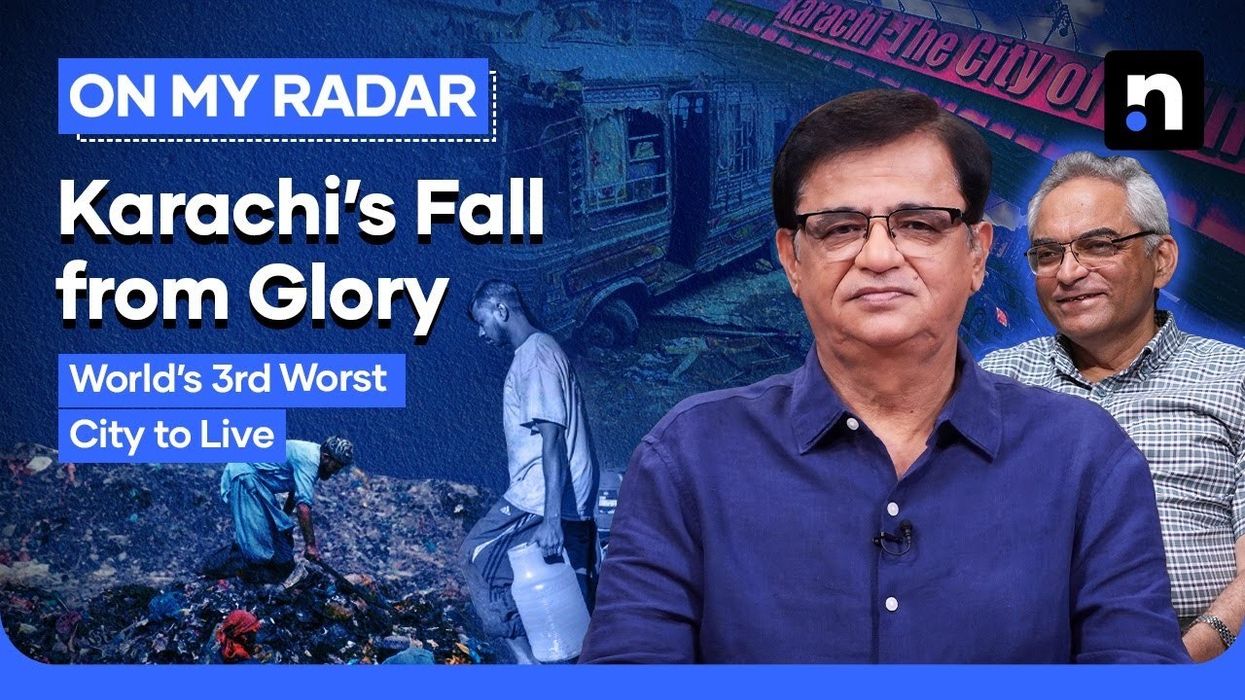Once the city of lights, Karachi now ranks among world’s worst places to live
Kamran Khan says Pakistan’s economic engine is now drowning in sewage, corruption and fear
News Desk
The News Desk provides timely and factual coverage of national and international events, with an emphasis on accuracy and clarity.
In a scathing critique of the state of Karachi, Kamran Khan has described Pakistan’s largest metropolis as a city in decay, warning that the nation’s economic engine is now sounding “war sirens” of urban collapse.
In his vlog, Khan said Karachi — once the capital of Pakistan and home to over 25 million people — has become a symbol of national misgovernance, with broken infrastructure, widespread corruption, and unchecked crime.
“Karachi is no longer the city of lights,” Khan said. “It has become the city of overflowing gutters, garbage piles, and thirsting citizens.”
From global attention to global shame
Karachi, which welcomed world leaders such as Queen Elizabeth II, U.S. Presidents Dwight Eisenhower and Lyndon Johnson, and Indian Prime Minister Jawaharlal Nehru in its post-independence years, now ranks 170 out of 173 cities in the Economist Intelligence Unit’s Global Liveability Index.
Only Tripoli, Damascus, and Dhaka scored worse, Khan noted. Last year, Karachi ranked fourth-worst. This year, it has dropped one more spot.
The index assessed infrastructure, transport, health, education and environment — all of which Khan said Karachi fails in. “The tragedy is that the city which contributes 60% of Pakistan’s and 90% of Sindh’s revenue is collapsing,” he said.
Unfinished projects and vanishing funds
Khan slammed the Pakistan Peoples Party (PPP), which has ruled Sindh since 2008, for what he called an “organized system of corruption” that bleeds Karachi dry.
He pointed to the K-IV water supply project — launched in 2004 to fix the city’s water shortage — which remains incomplete after 21 years. “The project started at PKR 8 billion,” he said. “It has now ballooned to PKR 125 billion.”
The federal government has taken over funding responsibility, but only PKR 3.2 billion was allocated for it in the latest budget, far short of the PKR 40 billion required. Khan said if that pace continues, the city may have to wait another decade for clean water.
Similarly, the S-III sewage treatment project, started in 2008, remains unfinished despite PKR 14 billion already spent. It was supposed to be completed in three years at an initial cost of PKR 8 billion, but now needs PKR 36 billion, Khan said. Only PKR 450 million has been set aside for it this year.
Crumbling roads, fake promises
Khan criticized the poor road infrastructure and rising traffic jams, saying only superficial patchwork has been done in select areas. “Dozens of announcements were made about Red, Blue, and Yellow bus lines,” he said. “But the reality is a few Red and Pink buses.”
Khan accused the PPP of using token gestures to shirk responsibility while thousands still wait for adequate transport in a city of millions.
He also highlighted the lack of green spaces, parks, and public grounds — many of which he said have fallen victim to “China-cutting” land grabs.
“Pollution is out of control,” Khan said, adding that Karachi often ranks among the top five most polluted cities in the world. “Most street lights don’t work. Some even remain lit in broad daylight.”
Corruption and lawlessness
Khan said Karachi is plagued by illegal construction and land encroachments, with government departments like the Sindh Building Control Authority and Board of Revenue being “dens of bribery.”
“Posting officers in these departments requires millions in bids,” he alleged.
He lamented the failure of the Safe City Project — a security initiative that has stalled for years despite rising street crime. “Kabul has implemented it. Why not Karachi?” he asked.
According to Khan, Karachi now averages more than 250 street crimes daily. “The criminals are fearless. Robbery and even murder on resistance are becoming normal.”
'No more excuses'
Khan dismissed arguments about federal-provincial tensions or administrative gridlocks, noting that Karachi’s mayor, most union council leaders and town administrators all belong to the PPP.
“There are no more excuses. The PPP has had a monopoly over Karachi’s fate for 17 years — and this is the result,” he said.











Comments
See what people are discussing